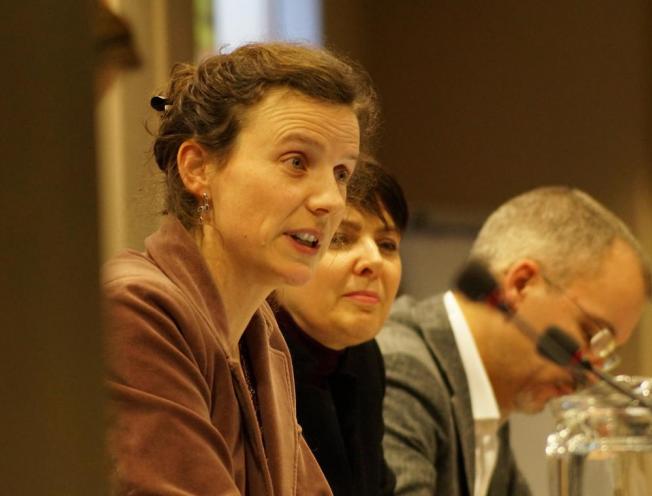Anneleen De Bonte van FairFin sprak dinsdag op de conferentie van de FRDO. De vraag die ze voorgelegd kreeg was Can asset managers and bankers promote corporate social responsibility? Wel ja, als ze écht zouden willen... Lees hier haar volledige lezing.
"Last year I talked about the mainly practical problems and legal obstacles that we encountered during FairFin’s pilot project on a sustainable second pillar pension product for independent health care workers.
This year I would like to share some thoughts with you on the puzzling experience it sometimes was to talk to portfolio managers, insurance brokers, bankers and CEO’s. When I read the question this panel would discuss ‘Can asset managers and bankers promote corporate social responsibility?’ the first thing that came into my mind was ‘Yes! if only they wanted to…’
Let me first outline the background that determined my decision to explore the financial sector from within. This background consists of three points:
-
Our actual human society is facing several huge challenges at a time, of which climate change – at stake here today - is a major one.
-
Our economic and financial system are at the heart of many if not all of these problems so it will be a key to solutions as well.
-
The shift that is needed within this system is of a size and impact we’ve hardly seen before.
I am convinced that many of you in this room agree with these three statements. For those who doubt, who think it’s exaggerated or see another example of typical activists’ apocalyptic thinking, I’d like to refer to the ‘Global Risks Report 2019’ issued by the World Economic Forum (I guess you all know this bunch of left green activists). The subtitle of this report says: ‘Out of Control’ and it begins with the question ‘Is the world sleepwalking into a crisis?’. On the subject of climate change it says: ‘Environment-related risks dominate the survey for the third year in a row, accounting for three of the top five risks by likelihood and four by impact. Extreme weather is again out on its own in the top-right (high-likelihood, high-impact) quadrant of the Global Risks Landscape 2019.’
So with that mindset and with a lot of questions I ended up at the table with portfolio managers who decide on investments of millions, even billions of euros – people’s pension and insurance money. I kind of expected two sorts of reactions. On one hand I was prepared to hear about a lot of practical and legal objections. Indeed an often heard answer was ‘we’d love to do better but we can’t because… (and then explanations follow about laws and benchmarks and so on)’ On the other hand I expected that I would have to defend over and over why the state of the planet is so alarming and why fossil fuels will have to leave portfolios before they can leave our lives. What I didn’t expect was this third reaction: ‘You are right, I agree with you as does my company since sustainability is a priority to us. So we can give you and your colleagues what you’re asking for.’ And then an explanation follows about the ‘proportionality principle’: ‘we will invest the exact amount of money in sustainable investments corresponding to the number of people asking for it. Apart from that we follow the law and the best international standards on sustainability’. Whether this answer hides a marketing strategy or whether it is an authentic conviction – I’m still in doubt but striking it is.
Imagine I would consider my job as a doctor like that. They bring in a patient of whom 95% of the medical staff says he’s severely ill, even life threatening. One out of four of his children asks for treatment – the three others have other concerns, they don’t understand or they just don’t care. Would you deliver 25% of the necessary treatment when you are the doctor in charge and you are really convinced how bad the condition is?
There are brave exceptions and I have the greatest respect for those investors who show the courage to leave the well-known pure for profit strategies of finance and question the fundamental drivers of our actual system. But I must state that the mainstream way of looking at sustainability is that it’s a tailormade customer service for those who ask for it.
But what if we would apply the proportionality principle not only at the customer’s side? What if we would expect people to show responsibility and effort proportional to the actual and potential impact of their job on the world and on people’s lives? What if we applied proportionality according to the ecological and societal footprint of the financial sector?
When talking about responsibility and effort we can’t stop where laws and labels say we’re doing enough. We all know that any label and any agreement ends up on a down-negotiated ambition level – that’s how it works. If the melting speed of arctic ice outperforms all the predictions, I count on you to show as much motivation to outperform standards and labels as you do for benchmarks. Because only if we are really honest about the severeness of our patients’ illness and only if we accept all the uncertainty and discomfort that comes with that – only then we can talk about proper care.
Thank you.


